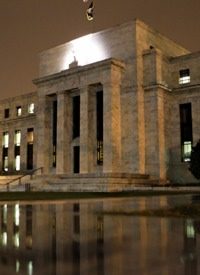
In addition to valiant congressional efforts for increased transparency, the Federal Reserve System and its cohorts are being targeted with criminal complaints and multiple lawsuits that attempt to shed to light on the central bank’s “bailouts” and its manipulation of the stock market, the precious-metals market, and more.
Some startling revelations have already surfaced, like the fact that under Timothy Geithner, the Federal Reserve Bank of New York set up front companies to purchase toxic assets from various firms. It has also become public knowledge that the Fed handed out hundreds of billions to foreign central banks and trillions to financial institutions. But there is still much more hidden in the shadows, and efforts to expose the secrets are growing.
Fox Business Network announced on April 20 that it was expanding its lawsuit against the Federal Reserve’s secret bailouts. And "The New American" has provided extensive coverage of Bloomberg’s lawsuit, which aims to force the banking cartel to disclose information about its so-called “emergency” lending program, which unconstitutionally and without appropriations from Congress provided trillions of dollars to various financial institutions.
Bloomberg won its original Freedom of Information suit, but the Fed obtained permission to delay disclosure while it appealed the ruling. The Fed lost again on appeal, arguing it was not subject to FOIA requests as a private entity and that disclosure would “harm” the institutions receiving bailouts. But despite the two court rulings, it has not yet given up and may even take the case all the way to the U.S. Supreme Court.
But while the Bloomberg lawsuit proceeds, investors who lost money because of the Fed’s market manipulations are exploring other options. A Florida investor who lost money after deciding to “short” financial institutions based on publicly available data has recently filed three felony criminal complaints with the Federal Bureau of Investigation and the Securities and Exchange Commission against the Fed, the Treasury, and various banks.
“Investors who had short positions or purchased ‘put options’ were defrauded of billions. I purchased short positions and was defrauded. I want to prosecute,” wrote investor, developer, and Republican Liberty Caucus of Florida chairman Will Pitts in his criminal complaint filed with the SEC. “Those guilty by their own admission should be arrested. Those who lost because of this fraud should be compensated for their loss.”
He is also working on initiating a class-action lawsuit to recover damages. “We’re assembling persons who were impacted as a result of these fraudulent activities and have spoken with a number of attorneys,” he told "The New American" in a telephone interview. “For [the Fed] to take action in the market to increase the value of the stocks, they’re directly defrauding everyone who’s on the other side of that trade.”
The efforts revolve around various actions taken by the Fed during the economic crisis under the guise of “stabilizing” the economy. In early-to-mid 2008, well-respected financial analysts evaluating the health of large banks and the real-estate market concluded that they were in bad shape, explained Pitts. Examining the publicly disclosed financial statements of the big financial institutions also revealed trouble ahead.
Based on that information, Pitts first sold his stock in large financial firms like Citibank and Bank of America while taking a short position, essentially betting that their value would go down. Along with countless others, he also decided to purchase various financial products using exchange traded funds (ETFs) that would increase in value as real-estate and the big banks’ fates declined. “But then, a strange thing started happening,” he explained: massive cash infusions and major purchases of equities and stocks in both financials and real-estate.
“When we begin looking at this — and it’s pretty common knowledge now — the central banks were loaning these large financial institutions huge sums of money at virtually zero percent interest,” Pitts recounted. “So they’re taking this huge amount of money that’s being borrowed from the Fed, and really making money doing two things: one is all of the banks buying each others’ stock and running up the value of it to increase their net worth on the books … and then they’re also borrowing huge amounts of money from the Federal Reserve and buying U.S. Treasuries … which means guaranteed returns from the U.S. taxpayer.”
Like countless others who were not privy to inside information about the Fed’s market manipulations, Pitts “absolutely” would have invested differently if the actions had been disclosed. And even if the Fed can successfully argue that it was not required to divulge the information, “those companies that had these material transactions all had an obligation to disclose these transactions that were occurring, and they didn’t,” he alleged.
The accusations being made in the criminal complaints have already been admitted by the Fed itself in some form or another. For example, in mid-2009, Fed boss Ben Bernanke acknowledged before Congress that the Fed had distributed over $500 billion to 14 foreign central banks from 2007 to the end of 2008 — so-called “liquidity” swaps. The money was then handed out to foreign financial institutions without being disclosed to the public. These actions obviously caused massive losses for otherwise-savvy investors who bet against the bailed-out banks without knowing that the failing firms would be rescued (using fiat money printed by central bankers at citizens’ expense).
There’s also the acknowledged “emergency” lending totaling more than $2 trillion that the Fed has refused to disclose details about, even after being ordered to do so by federal courts. Another startling example of blatant market manipulation by the Fed came to light earlier this month. Even before the congressionally approved “bankster bailouts” of 2008, the New York Fed — owned by private banks and led at the time by tax dodger and current Treasury Secretary Timothy Geithner — “extended credit” to three limited liability companies it created.
The fake firms then began to openly intervene in the market to help certain firms. Incorporated in Delaware, Maiden Lane LLC, Maiden Lane II LLC, and Maiden Lane III LLC used the Fed loans to purchase a variety of toxic assets from AIG and Bear Stearns, helping JP Morgan and Goldman Sachs, among others. These asset purchases included residential mortgage-backed securities, multi-sector collateralized debt obligations, and more. The New York Fed admitted to all of this on its website in April, justifying the measures by citing section 13(3) of the unconstitutional Federal Reserve Act.
Using available data, a Bloomberg analysis found that assets purchased by the Fed’s front companies have lost over half of their value. Some of the assets were garbage from the start, despite Fed reassurances. Ben Bernanke told Congress in April of 2008 that all of the Bear Sterns assets unloaded on the Fed (or more accurately, the American people) were “entirely investment grade.” But that was a lie. “After a brief glance at a few bonds, we now know that’s not true,” noted the Financial Times after crunching the numbers.
But stocks, bonds, and real-estate are not the only markets being manipulated by America’s central bank. Another recently filed lawsuit, which will be the topic of a related article, involves the Fed’s manipulation of the precious-metals market. Once again, average Americans lose while insiders profit.
Despite recent revelations, most of the Fed’s activities remain shrouded in mystery. It continues to fight court rulings ordering it to disclose lending information, but what has already come to light is troubling, to say the least. The Fed’s actions amount to — at minimum — a usurpation of the House of Representative’s constitutional authority to appropriate money, with countless investors suffering as a result. It is to be hoped that as investors, legislators, and taxpayers continue to demand answers, the truth will finally come out and, if warranted, the prosecutions can begin.
Photo of Federal Reserve: AP Images



